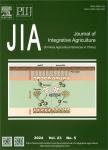Challenges and prospects for consumer acceptance of cultured meat
Challenges and prospects for consumer acceptance of cultured meat作者机构:Department of Agricultural Economics Ghent UniversityGent B-9000 Belgium INP-ENV ToulouseToulouse 31076 France UR1303 ALISSINRA Ivry-sur-Seine 94205 France
出 版 物:《Journal of Integrative Agriculture》 (农业科学学报(英文版))
年 卷 期:2015年第14卷第2期
页 面:285-294页
核心收录:
学科分类:12[管理学] 04[教育学] 0710[理学-生物学] 0402[教育学-心理学(可授教育学、理学学位)] 0832[工学-食品科学与工程(可授工学、农学学位)] 120301[管理学-农业经济管理] 040203[教育学-应用心理学] 0830[工学-环境科学与工程(可授工学、理学、农学学位)] 1203[管理学-农林经济管理] 1004[医学-公共卫生与预防医学(可授医学、理学学位)] 0905[农学-畜牧学] 0906[农学-兽医学] 0901[农学-作物学] 0703[理学-化学] 0902[农学-园艺学] 0713[理学-生态学]
主 题:acceptance artificial attitude consumer cultured in vitro meat synthetic
摘 要:Consumer acceptance of cultured meat is expected to depend on a wide diversity of determinants ranging from technologyrelated perceptions to product-specific expectations, and including wider contextual factors like media coverage, public involvement, and trust in science, policy and society. This paper discusses the case of cultured meat against this multitude of possible determinants shaping future consumer acceptance or rejection. The paper also presents insights from a primary exploratory study performed in April 2013 with consumers from Flanders(Belgium)(n=180). The concept of cultured meat was only known(unaided) by 13% of the study participants. After receiving basic information about what cultured meat is, participants expressed favorable expectations about the concept. Only 9% rejected the idea of trying cultured meat, while two thirds hesitated and about quarter indicated to be willing to try it. The provision of additional information about the environmental benefits of cultured meat compared to traditional meat resulted in 43% of the participants indicating to be willing to try this novel food, while another 51% indicated to be ‘maybe' willing to do so. Price and sensory expectations emerged as major obstacles. Consumers eating mostly vegetarian meals were less convinced that cultured meat might be healthy, suggesting that vegetarians may not be the ideal primary target group for this novel meat substitute. Although exploratory rather than conclusive, the findings generally underscore doubts among consumers about trying this product when it would become available, and therefore also the challenge for cultured meat to mimic traditional meat in terms of sensory quality at an affordable price in order to become acceptable for future consumers.



